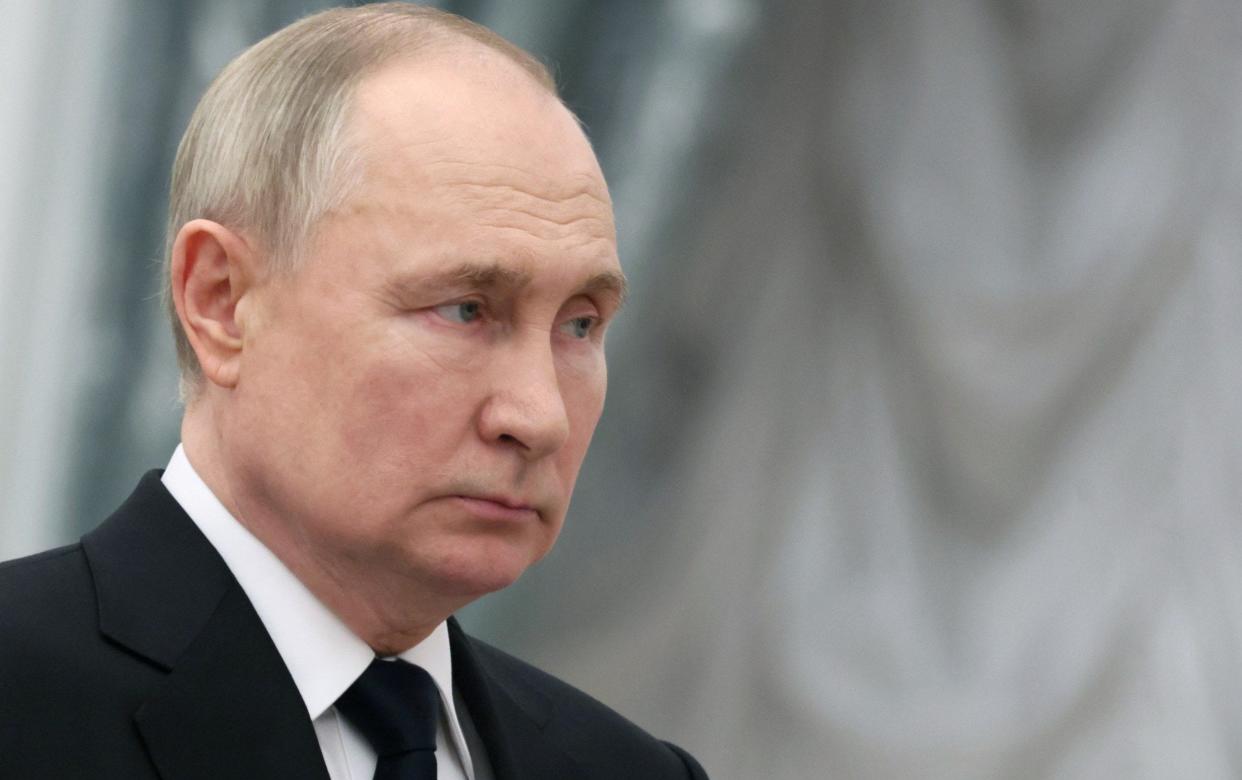Vladimir Putin can be tried for his crimes now

- Oops!Something went wrong.Please try again later.
This month, the Russian people chose as their president for the next six years an international criminal for whose crimes they bear the same political responsibility as Germans who once supported Hitler. Both leaders are guilty of what the court at Nuremberg described as “the supreme international crime”, that of aggression – i.e. invading an unthreatening country for no good reason – and thereby becoming liable for “all the evils, all the horrors of war; all the effusion of blood, the desolation of families, the rapine, the ravages – they are his works and his crimes”.
It is possible to envisage a modern Nuremberg tribunal, with Putin taking Goering’s place in the dock, flanked by co-conspirators like Lukashenko from Belarus, Dmitry Medvedev, the commanders who supervised the destruction of Mariupol and the executions at Bucha, and the lying propagandists from state television and the Orthodox Church.
The most important of these cheerleaders will be the Patriarch, Kirill, a former KGB colleague who forgave the indiscriminate bombing and the killing as part of a “holy war” against the West, in which Russian soldiers who died would go to heaven.
The problem with this picture is its improbability. For the present, there is no court available to try Putin – which is why some 39 democratic nations, including the UK, have set up a “core group” to examine how to create an “aggression tribunal” to deal with him in the event that he is overthrown.
Putin is, without doubt, guilty of the crime of aggression, but must be proved guilty. The law is clear enough. Aggression was outlawed by the UN Charter, and criminal responsibility for enforcing it was left to the International Criminal Court (ICC), which eventually came up with a simple definition that came into effect in 2018. It is committed by any political or military leader who breaches the UN Charter by invading another member state with a force of the “character, gravity and scale” that makes the breach “manifest”. This definition fits Putin like a glove.
The only defence he can offer is self-defence under article 51 of the UN Charter. He may claim entitlement to attack and kill Ukrainians because the country might have joined Nato and Nato might have attacked Russia. This is called “pre-emptive self-defence”.
Putin would doubtless rely on the arguments being advanced by a so-called “realist” school of academics, that Nato is to blame for the war because it failed to honour promises made to Russian leaders in 1990. Such promises (“not a step further east”) might well have been made orally, but were never put in writing. The notion that Putin was unfairly provoked is now being peddled by some professors, but it is difficult to credit them with either intelligence or morality because they ignore the rights of Ukrainians to life and liberty.
So Putin’s defence would be rejected by any bench of international judges. But where is the court that can try him? The ICC has issued an arrest warrant, but he is unlikely to turn up at the Hague and this court has no power to try him in his absence. It has jurisdiction to put leaders on trial for aggression, but (absurdly) only if they agree to be tried – it cannot indict leaders of states that are not ICC members.
There is only one solution if his guilt is to be authoritatively declared. That is by a trial in absentia.
This expedient is always opposed by Anglo-American lawyers – how, they ask, can a trial be fair if the defendant plays no part in it? But such trials work effectively in some European countries and (importantly) in Ukraine itself. Moreover, there is nothing that Putin’s presence could add to the evidence or the arguments at his trial for aggression – the facts of his invasion are unchallengeable, his defence of self-defence against likely Nato aggression can be judged on expert evidence and, to the extent that is relevant, his own opinions are amply available from his speeches, writings and interviews.
The trial would give some real meaning to the crime of aggression, which has never been the subject of legal proceedings since Nuremberg. It is important to set a precedent which may serve to deter others.
One of the founders of international law, Emmerich de Vattel, as long ago as 1760, described those guilty of aggression in terms that judges could invoke in sentencing Putin, if they convict him. He is “guilty of a crime against the enemy… He is guilty of a crime against his own people. Finally he is guilty of a crime against mankind in general whose peace he disturbed and to whom he sets a pernicious example.”
Geoffrey Robertson was president of the UN’s war crimes court in Sierra Leone. His book, ‘The Trial of Vladimir Putin’, is published by Biteback this month

